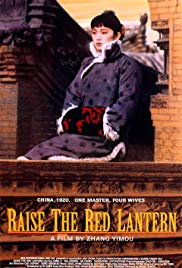
RAISE THE RED LANTERN
China, 1991, 125 minutes, Colour.
Gong Li.
Directed by Zhang Yimou.
During the 1980s, Zhang Yimou was a significant cinematographer. He worked on such films as Yellow Earth, a film of great visual beauty. Visual beauty was to the characteristic of the director’s films for the next three decades. He also designed the opening ceremony for the Beijing Olympic Games in 2008.
During the 1990s he produced quite a number of films, sometimes going back into Chinese history, as with this film about the 1920s, sometimes looking at contemporary issues. He won many awards, his films screened in various festivals, ecumenical and Catholic organisations also making awards to his films. His films at the end of the century, Not One Less and The Road Home are fine examples of small-scale humanitarian dramas.
During the 2000s he moved into elaborate martial arts and historical films, again with great beauty, films like The House of the Flying Daggers. After that, he experimented with a number of different subjects and styles. Quite moving is his film about the siege of Nanking, The Flowers of War,
The star of his films in the 1990s was Gong Li who emerged as an international star.
1. The film considered as a Chinese classic? The work of the director, his background as a cinematographer, his career as a director, the Beijing Olympics, Chinese dramas, history, martial arts and mythologies?
2. The beauty of the film, the colour photography, the seasons, compositions and movement, costumes and decor, architecture and structures? The musical score, the range of instruments and style?
3. 1920, social background, Chinese history, manners, mores? Customs and life? Wealth, power? The power of men? The roles of women, wives and concubines, servants?
4. The title, the lanterns and the sign of the husband visiting the wife? The other colours at the door of the other wives? The visuals of the lanterns, met of her?
5. The household situation, Chan and his power? His face never being seen? Presence? Women? His decisions, treatment of various will? Servants? The doctor and the discovery of the affair?
6. The initial focus on some, the close-up of the base, the audience contemplating her, her age, her father’s death, the house the visuals of the vistas?
7. The portraits – and the hierarchy of wives, the seniority of the oldest wife, having borne a son? The role of the second, the scheming? Her initial friendship towards Songlian? The third wife as an opera singer? Her ambitions?
8. Songlian, her wanting status, the pretence of pregnancy, the blood on the cloth, her period, the maid, reporting to the wife?
9. The role of the doctor, his affair with the wife, exposing the sham? The effect on Songlian?
10. The storage of the lanterns, the role of the maid, her ambitions, her lies? In the snow, no apology, sickness and death?
11. Songlian changing, the experience of her life in the house, the passing of the seasons, the relationship with her husband, turning 20, alone, her drinking, the doctor and the affair, her exposing the affair, watching the arrest, the wife taken for execution?
12. The taking of another wife, sombrely and alone – and the finale with her insane.